- Home
- Cocker Spaniel training
- Potty training an adult dog
Potty Training An Adult Dog
The need for potty training an adult dog often arises following time spent in an adoption or rescue centre, but there are other reasons why an older dog may regress and break his toilet habits.
Explore other reasons for a dog's lapse in toilet habits, about housebreaking an older dog, and look forward to a dry house again!
Potty Training An Adult Dog: Reasons for Lapses
The need to potty train an adult dog often arises following time spent in an adoption or rescue centre. Their toilet habits often regress when they reach their new home.
Over-Confinement In Kennels
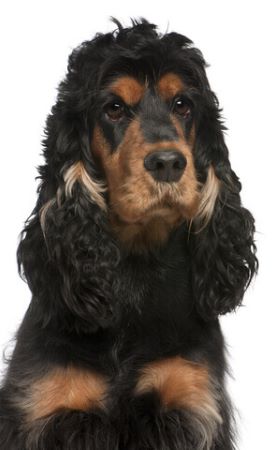 Potty training an adult dog - back to basics!
Potty training an adult dog - back to basics!When the dog was confined in its kennel for too long and simply couldn't wait any longer, it just had to pee (or poop!) in the kennel.
Where this happens often, it's no wonder the dog gets used to peeing in its own den. He gets out of the habit of waiting to be let out, and his toilet habits simply fly out of the window!
Stress And Anxiety
Any change in environment or routine can cause stress, which can impact housetraining.
The stress and anxiety associated with moving to a new home can be quite considerable for an adult dog.
Your adopted dog will need time to settle into his new home, and you'll both need time to get to know each other. In particular, you will need to understand the signs that your dog shows to let you know that he wants to go out.
He will need time to get to know you, his new environment, and your routines.
Other Reasons Your Cocker May Soil Your Home
If your dog isn't a rescue, there may be other reasons for an interruption in your dog's toilet habits. For example:
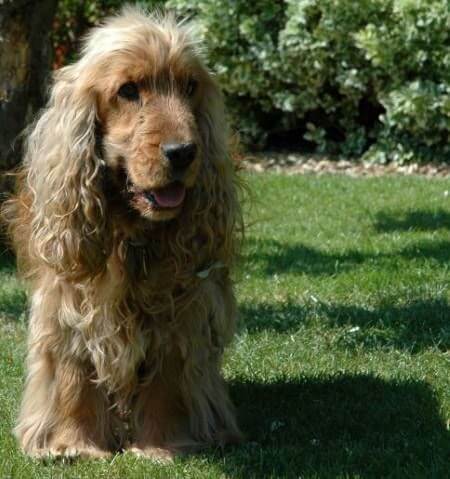 Come on Mum, I've peed already, now throw the ball!
Come on Mum, I've peed already, now throw the ball!Changes Within The Family While Potty Training An Adult Dog
A recent addition to the family, for example, another pet, a new baby, or the loss of a family member, can cause an interruption in your dog's toilet habits.
Your Dog May Have Health Issues or Behavioural Problems
You must establish that the need for potty training an adult dog hasn't arisen because of an underlying health problem or isn't simply a behavioural issue.
That's why it's essential to get the green light from your vet that your dog is healthy.
Your vet may refer you to a dog behaviourist if it's a behavioural problem.
Potty Training An Adult Dog - Is He Marking His Territory?
If your dog believes another animal is encroaching on his territory, it will pee (or even poop), marking its territory to warn off other dogs.
Not all dogs are territorial, but those that are will cover their area with their scent whenever they get the opportunity!
Do You Have A Submissive Cocker Spaniel?
If your Cocker Spaniel's temperament is submissive in nature, he may pee with excitement when meeting someone for the first time or meeting a favourite member of your family.
The same may apply if your dog feels frightened or bewildered. For example, if your dog is afraid of noisy jets, sirens, etc., he may lose control of his bladder or bowels. This may be the result of your dog not having adequate socialization.
I know of a Cocker Spaniel that is frightened of storms, especially the sound of thunder. Whenever a storm is brewing, his owner closes all blinds and curtains, puts on all televisions, and plays music to dull the sound of the storm.
It works too!
Toilet Training Dogs!
When potty training an adult dog, it's best to adopt a structured and consistent approach, especially if you're going to be successful sooner rather than later!
You may be housetraining your Cocker for a second time. You may have rescued an adult Cocker Spaniel, and its toilet habits could be better! Or any of the reasons mentioned above. Either way, a structured approach is necessary.
However, if you're puppy housetraining, you'll probably need to approach the task in a much more structured and detailed way.
The principal reason is that a young puppy cannot hold his bladder or bowels for long at this tender age. It will need many more opportunities to take toilet breaks.
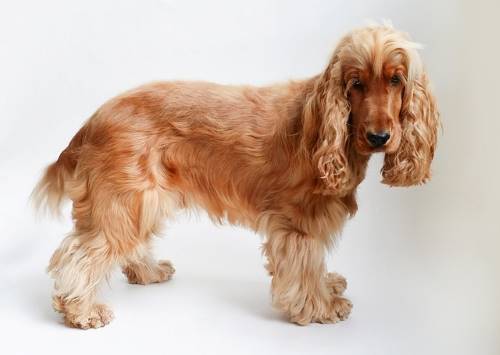 Mum, I need to go out to pee!
Mum, I need to go out to pee!Nor will he understand your commands, as he won't yet have had puppy obedience training, and he most certainly won't understand what 'NO' means!
Whether you're toilet-training puppies or house-training dogs, I recommend reading this potty-training a puppy article before you read this page to better understand the process.
Your cocker spaniel needs to understand that doing his 'toilet' in your home is a definite 'no-no'. He needs to learn that the correct place to relieve himself is outside the house, in the garden and/or during his daily walk(s).
Dogs and puppies will try their best not to soil their own dens, which is why crate training your dog can be a great help when housebreaking an adult dog or puppy.
Of course, I can't guarantee there won't be any little 'accidents' if you crate your cocker spaniel, although touch wood, our Cocker hasn't yet had an 'accident' whilst in his crate.
IMPORTANT NOTE: If an adult dog suddenly begins to pee and poop indoors, where he was previously fully house-trained, and there hasn't been any upset or change to family circumstances (for example - an additional pack member (human or canine) or moving house), it's essential to understand that your Cocker's new behaviour may be the result of an underlying health problem.
In these circumstances, you should take your pet to see his vet to ensure there's nothing medical that needs attending to.
Toilet Training Dogs? Try To Catch Him Before He Acts!
You need to be constantly alert when potty training an adult dog. This will help you to see a pattern emerge which may indicate that your dog wants to do his toilet:
- He may begin to sniff the floor with some urgency;
- He may turn round and round in small, tight circles, almost as if he's going to sit;
- If he begins to squat, it's your signal to move quickly!
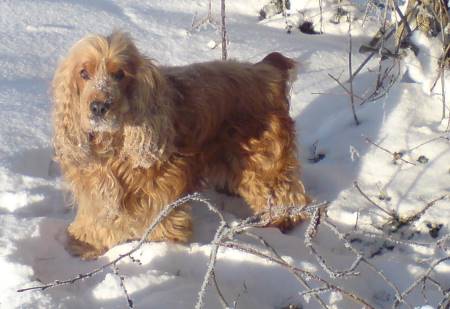 I love this snow, even the yellow patches!
I love this snow, even the yellow patches!- Holding his tail high could be a sign that your dog is about to poop;
- If he's crying or whimpering at the door, he's asking to be let out.
The second you see your dog displaying any of the above signs in your home, take him outside immediately.
If you've chosen a particular part of the garden for him to use as his toilet, quickly take him to that spot.
Heap loads of praise on him when he gets it right.
If he gets it wrong and pees or poops in your home and you fail to catch him in the act, don't chastise him; he won't understand what he's done wrong.
Simply clean it up and get on with your day.
If you catch him in the act or just as he's about to poop or pee, say 'No' in a firm voice.
Your Cocker will link your disapproval with this act or his intentions, and he'll soon begin to understand what you want from him.
Leave it for more than a few seconds, and he won't make that link.
If you're too harsh with him, there's the possibility that you'll frighten him so much that the next time he tries to hide it, he'll poop behind the sofa or behind the curtains!
Thoroughly Disinfect Soiled Areas
While potty training an adult dog, your dog will inevitably have at least one little 'accident' inside your home and probably on your best rug!
Although the spot may look and smell clean to us, unless you've used a special urine cleaner, your dog will still be able to smell the ammonia in his urine.
This will often encourage your dog to pee again in the same spot.
I recommend using a specially formulated pet urine deodorizer which can be bought relatively cheaply from any good pet store.
Alternatively, your vet may sell it over the counter.
Another option would be to try a biological household cleaner and white vinegar to eliminate residual odour.
Potty Training An Adult Dog: Summary
When potty training an adult dog, it's essential to ensure your pet is allowed outside regularly to his toilet to help minimise any little 'accidents' in the home.
Establishing a strict routine such as this will help to get your adult Cocker back into his regular toilet routine.
Praise your dog when he gets it right and only scold him when he gets it wrong - so long as you catch him doing it or within seconds of pooing or peeing in the house.
Never punish your dog for little accidents - all you really need to do is let him know it's unacceptable.
Reward him when he gets it right!
As mentioned earlier, housetraining an older a dog will need a comprehensive strategy, but whether you're potty training an adult dog or a puppy, you need a plan!
Follow the advice given in our article on potty training a puppy, together with the advice on this page and your dog will be fully house-trained in the blink of an eye!
I hope you've found this article on toilet training an adult dog helpful.
If you still need to be convinced of the benefits of crate training a Cocker Spaniel, why not take a look at this article. I'm confident it will convince you that dog crates aren't cruel and offer many benefits for you and your dog.
Photo Credits for Toilet Training Dogs:
1. Isselee at Dreamstime.com - https://www.dreamstime.com/royalty-free-stock-photography-close-up-english-cocker-spaniel-2-years-old-image22516437
2. Copyright About Cocker Spaniels
3. BiancaVanDijk at https://pixabay.com/photos/dog-animal-mammal-cocker-spaniel-6538093/
4. Copyright About Cocker Spaniels
Problems Potty Training An Adult Dog
Sometimes you may find yourself coming up against problems when toilet training an adult dog, especially when they've regressed.
Here are a couple of questions and answers from our visitors relating to their experiences.
Problems Potty Training My Adult Dog
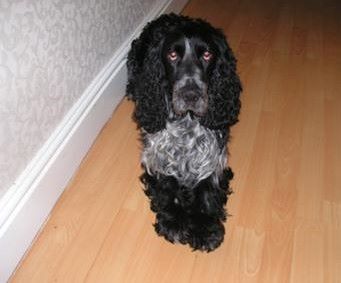 My Mum says I'm having potty training problems!
My Mum says I'm having potty training problems!Hi, we're having problems potty training a 3-year old cocker spaniel which we adopted from the cocker rescue in Austin, Texas.
The original owners returned the dog as an owner surrender because of an inability to potty train the dog for about a year. Unfortunately, the foster parents did not mention this to us.
The cocker is not abused and has a wonderful temperament.
She's been checked by our vet and passed the exam with flying colors. She's an indoor dog and enjoys our walks three times a day.
We've had her for about three weeks now and her indoor habits vary, with no definite regularity for either peeing or pooping.
What things have worked for you to begin to manage the problem?
Problems Toilet Training An Adult Dog
Answered by: Pauline (Website Owner)
I'm sorry to hear about your little problem with your rescue dog but I'm confident that you'll have it remedied very soon.
You've had her checked out by the vet so you know she's otherwise healthy - that's good news!
Trauma Of A New Home
As you've only had her for three weeks, the upset and 'trauma' of moving into her new home and having to get used to a new family may be causing your cocker's irregular toilet breaks.
If this is contributing towards the problem, she'll obviously settle down once she becomes more familiar with her new environment and her new family.
A Change In Diet?
Her digestive system may be reacting to a change in diet. Do you know what she was fed at the rescue centre?
They normally give you couple of days' supply to allow you to source the type of food she's been used to.
If you intend to change to another make of dog food, it's best to do it gradually so that it doesn't upset her delicate digestive system.
It's Early Days!
Personally, I believe that once she's familiar with her new environment, new doggie parents, and settles down to a regular feeding program, twice each day, and regular walks to stimulate her bowels, her toilet patterns will develop and get back to normal.
Potty Training Your Cocker Spaniel
However, from the sound of it, I suspect your Cocker was never really fully house-trained, so I would recommend you begin all over again.
The trick is to see the signs that she's about to poop or pee and stop her in her tracks by giving her the 'No' command, in a firm voice.
Don't shout as that could frighten her. The firm command will probably have the effect of startling her (not frightening her) into stopping in mid-stream.
Take her outside immediately to the area you have designated for her toilet and allow her to continue. When she's finished, praise her profusely and offer her a treat.
She'll learn that one type of behaviour gets your disapproval and another gets lots of praise and even a treat!
I am assuming that you are using a pet urine cleaner to clean up after her.
If you're not, although it will look and smell clean to us humans, your Cocker will be able to smell where she's been which may encourage her to go there again - it's a never ending cycle unless you can remove all smells.
You can buy this type of cleaner at most pet stores. Your vet may also sell it over the counter.
If she continues to do her toilet in your home, it's because you weren't there to stop her. (We can't always be around though, can we?)
However, until she's fully house-trained, it's important for you to be around to catch her in the act so that she understands what you do and don't want from her.
If you 'scold' her after she's done the deed, she won't link the two together meaning she won't understand what she's done wrong.
If you haven't already, did you know that crate training your dog can help with toilet training?
If you're not convinced, you can read about the benefits of crate training here.
If you need a refresher on potty training your puppy simply follow the link and it will take you through all the steps to get your dog fully house trained.
I sincerely wish you best of luck and hope you have lots of happy times with your new Cocker Spaniel!
Visitor Comments: Potty Training Problems
Potty Training Problems
By: Anonymous
Take her outside every hour on the hour and coax her to do her business - that should work. When she pees or poops tell her she's the best dog in the world. Show her how pleased you are with her.
Don't scold her for peeing or pooping in the house because this won't work. It won't stop her.
I have used a dog smell removal spray in the past when I've cleaned up in the house (after my dog) and I recommend you do the same otherwise she's going be encouraged to go in that same spot again when she smells her pee.
Even though you think it's clean, your dog will still be able to smell it unless you use a special cleaning product.


